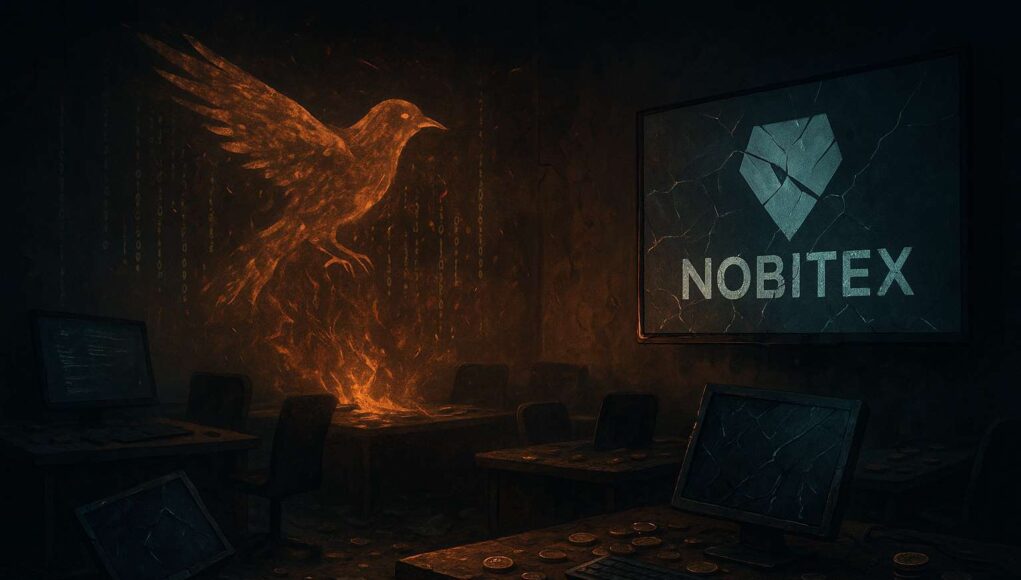In one of the most politically charged hacks of a crypto platform to date, Iran’s largest digital asset exchange, Nobitex, has fallen victim to a sophisticated cyberattack. The perpetrators, a group identifying themselves as Predatory Sparrow, claim to have stolen and destroyed over $90 million in Bitcoin, Ethereum, and USDT. Simultaneously, they wiped servers and leaked internal documents.
The Nobitex breach is far more than a criminal exploit. It is a flashpoint in a growing cyber war that increasingly treats cryptocurrency as both target and weapon. From geopolitical sabotage to cybersecurity lapses and state-imposed regulation, the incident is a case study of crypto infrastructure’s vulnerabilities when under pressure from global conflict.
Inside the Nobitex Hack: The Heist That Shook Iran’s Crypto Sector
The breach occurred in mid-June 2025. Predatory Sparrow, a group long suspected of Israeli affiliations, claimed responsibility for the incident.
The hackers’ operation was not limited to digital theft. According to blockchain analytics firms like Elliptic and Chainalysis, the group drained tens of millions in assets before deliberately destroying wallets and backend systems.
What sets the Predatory Sparrow cyberattack apart is the hybrid nature of the assault. It combined financial theft, infrastructure sabotage, and the strategic release of sensitive Nobitex communications.
On-chain data confirms that stolen assets include Bitcoin, Ethereum, and Tether. Forensic tracing suggests a coordinated withdrawal pattern designed to bypass Iran’s internal surveillance and capital controls.
Cyber Warfare by Proxy: Crypto’s Role in the Israel-Iran Standoff
In a public statement, Predatory Sparrow accused the Iranian regime of financing terrorism and claimed their actions were in retaliation. Analysts widely interpret this as a clear escalation in the Israel-Iran cyber conflict, following a series of attacks on fuel distribution systems, steel plants, and defense infrastructure in recent years.
Cryptocurrency platforms like Nobitex are increasingly seen as strategic targets, not merely for financial gain, but for their symbolic and practical roles in national economies. The Iran crypto exchange hack may represent a broader evolution in modern cyber warfare. We witness the weaponization of decentralized financial systems by state-linked actors.
>>> Read more: Crypto Investor Loses $6.9M in Douyin Cold Wallet Scam
Iran Responds with Regulation: Crypto Curfews and Centralized Oversight
Following the Nobitex hack, Iranian regulators imposed strict measures to restore control over digital platforms and user activity. Iranian authorities implemented a so-called crypto curfew, restricting trading hours on exchanges and intensifying surveillance requirements.
The Central Bank of Iran and other regulators have ordered Nobitex and its competitors to submit detailed logs, user data, and revised security protocols.
While officials claim these measures are essential for national security, critics argue that the response penalizes users. It also ignores the underlying cybersecurity failures that enabled the breach. This aggressive stance underscores a shift in Iranian crypto regulation, prioritizing state surveillance over decentralized principles.
Security Gaps and a Fragile Infrastructure
Leaked internal messages, published by Predatory Sparrow, reveal glaring vulnerabilities in Nobitex’s security architecture.
The absence of robust cold storage protections, outdated server infrastructure, and potential conflicts of interest between Nobitex and Iranian authorities are now under scrutiny.
Experts warn that Iran’s sanctions environment has long made it difficult for exchanges like Nobitex to access modern cybersecurity tools. They were left exposed to state-grade cyberattacks.
The Nobitex security failure is a stark reminder that geopolitics doesn’t just impact markets—it can collapse platforms. The Nobitex case has become a cautionary tale for crypto exchange cybersecurity, especially in regions facing geopolitical strain.
Global Reaction and Strategic Implications
While global crypto markets remained relatively stable in the immediate aftermath, compliance experts are paying close attention.
Firms like Chainalysis and Elliptic are tracking the stolen funds and warning exchanges to bolster defenses.
The broader concern is conceptual: Can a crypto exchange in a sanctioned or authoritarian regime ever achieve true operational security? The geopolitical risk exposed by the Nobitex hack challenges the long-held notion that decentralized systems are immune to state interference.
Conclusion: Nobitex as a Geopolitical Fault Line
The $90 million crypto heist at Nobitex is more than a high-profile breach. It’s a multi-layered incident at the intersection of cyberwarfare, financial sovereignty, and digital authoritarianism.
>>> Read more: CertiK May Report: Social Engineering Drives 2025 Crypto Losses
As the Nobitex hack demonstrates, crypto exchanges are no longer just financial platforms. Crypto is firmly entrenched in the playbook of global conflict, and exchanges have become political targets in a digital battlefield. Platforms and users must reckon with a new reality: in today’s world, your wallet can be a target.
Readers’ frequently asked questions
Is Nobitex still operational after the cyberattack?
Yes, as of June 2025, Nobitex remains operational but under strict regulatory oversight. Trading hours have been limited, and the platform is required to comply with new data and infrastructure mandates issued by Iranian authorities.
Were user funds completely lost in the Nobitex hack?
According to blockchain analytics and the hackers’ own statement, much of the stolen crypto was destroyed or rendered unrecoverable. Nobitex has not confirmed full details publicly. Users are advised to monitor official updates for restitution options.
What can users do to protect their crypto on regional exchanges like Nobitex?
Users should consider withdrawing long-term holdings to self-custodied wallets, enable all available security features, and stay informed about regulatory and cybersecurity developments in their jurisdiction.
What Is In It For You? Action items you might want to consider
Evaluate your exchange exposure in geopolitically risky regions
If you trade or hold assets on exchanges operating in sanctioned or high-risk jurisdictions, assess the political and cybersecurity stability of those platforms.
Transition to self-custody where possible
Given the irreversible losses in the Nobitex case, storing crypto in non-custodial wallets with strong recovery options offers a layer of protection in case of breach.
Monitor cross-border crypto restrictions
Iran’s post-hack clampdown may foreshadow similar moves by other governments facing political or financial pressures. Traders should follow curfews, KYC tightening, or capital controls closely.











[…] >>> Read more: Nobitex Hack: $90M Crypto Heist Tied to Israel-Iran Cyber Conflict […]